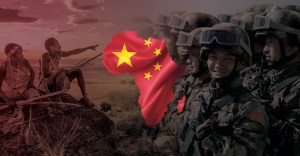
Colonizing by Lending

Colonisation is no longer what it once was. Actually, it just doesn’t use the same means anymore. Nowadays, to colonise, you lend, and that’s how you enslave. Over history, the debtor’s inability to pay has been used as an excuse to engage armies, like the British invasion of Egypt in 1882 because the country could no longer pay its debts. Punitive expeditions and military campaigns have now been replaced by the no-less persuasive weapon of worsened public deficits for nations that don’t have a sovereign currency that could be printed freely. In this light, the “independence” of many of these indebted countries is just an illusion when, in reality, they are beholden to their creditors.
The debtors have now switched sides though. And changed their method too. It is thus more than 150 countries across the globe that currently owe nearly 400 billion dollars to China through its initiative known as the “Silk Road Economic Belt”, with relative transparency since these debts are partially declared to the World Bank. Forty or so of these governmental debtors are very poor nations such as Cambodia, Myanmar, Laos, the Maldives and Papua New Guinea, who owe China more than 10% of their respective GDPs. So, while colonisation has become much less dangerous in terms of human losses for the powers-that-be in search of domination, an additional change is taking shape. In fact, the debts granted to governments attract much more attention than those given to businesses in these poor countries. This is why 70% of the sums lent by China are now – not to governments – but to public, private enterprises and to local banks in these countries suffering financial distress.
A new ravine is now being dug, with loans given out to non-governmental organisations not having to be declared to international institutions or to the country’s authorities, when they exist. These substantial sums moving from the Chinese Treasury to private borrowers are passing completely under the radar as they are not subject to any obligation to be declared in their respective countries, and most of the time are not even mentioned on the organisations’ balance sheets. For the leaders of these countries that owe so much to China, how can they go about governing a country where the blurring of the lines between public and private debt is knowingly maintained by creditors? And how can they even begin to protect the interests of these private debtors to stabilise the economy when they are totally unaware of the overwhelming majority of their debts?
Mao left China very poor, mainly for ideological reasons, having been obsessed with eradicating the power of the economic elites that was concentrated mainly along the coasts. For forty years now this nation – equipped with a sophisticated culture and a huge workforce – has extended its influence, not hesitating to resort to the most traditional of imperialist subterfuge. Today still, debt leads to submission. It is therefore not so different from the time when Rosa Luxemburg wrote in 1913: “European capital has largely swallowed up the Egyptian economy.”
Dear readers,
This blog is yours: I maintain it diligently, with both consistency and passion. Thousands of articles and analyses are available to you here, some dating all the way back to 1993!
What were once considered heterodox views on macroeconomics have, over time, become widely accepted and recognized. Regardless, my positions have always been sincere.
As you can imagine — whether you’re discovering this site for the first time or have been reading me for years — the energy and time I dedicate to my research are substantial. This work will remain volunteer-based, and freely accessible to all.
I’ve made this payment platform available, and I encourage you to support my efforts through one-time or recurring donations.
A heartfelt thank you to all those who choose to support my work.